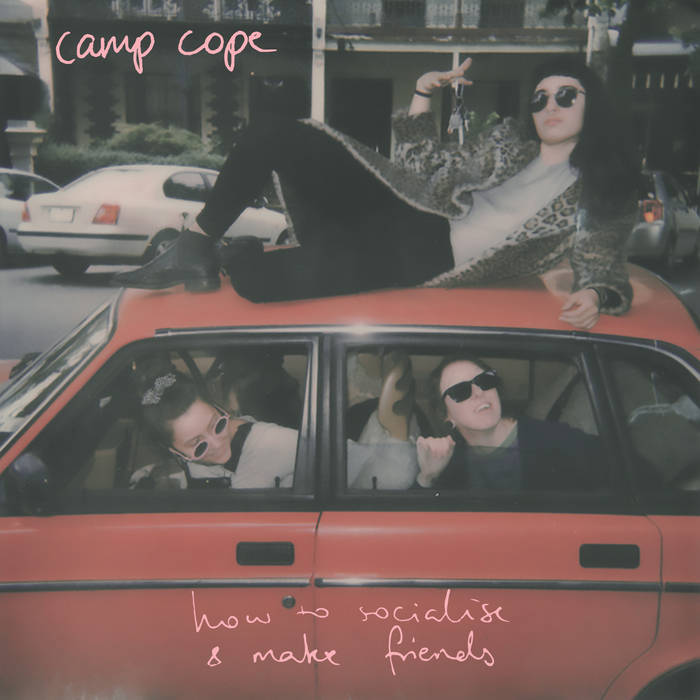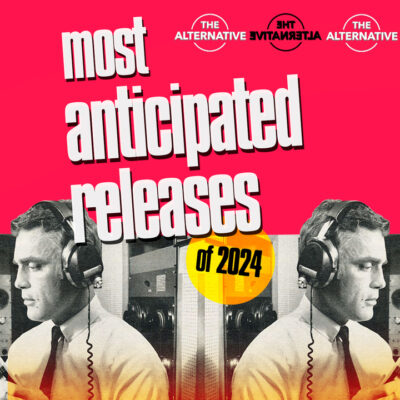Review: Camp Cope—’How To Socialize & Make Friends’
Posted: by The Editor

How To Socialise & Make Friends, the sophomore album from Melbourne punk trio Camp Cope, is a true testament of taking back one’s agency. The group fights to regain power that many have lost due to systemic misogyny throughout not only the music industry but also various social and political structures. Through discussion of self-reflection and personal growth, the album provides listeners with a whirlwind of powerful emotions. Every line Georgia Maq vocalizes thrives with a sense of urgency as Kelly-Dawn Hellmrich and Sarah Thompson drive the flow with striking basslines and sturdy drum beats, respectively.
After releasing their debut album in 2016, the group received widespread praise. Coming from humble beginnings out of Melbourne’s punk scene, the women felt out of place around their male counterparts. Instead of sulking on the prospects of the scene, they instead took that frustration and made it into something powerful. The beginning of the album serves as a direct call-out to the gatekeepers of the industry, to everyone who doubted them, and anyone who questioned their abilities just because they were women.
“The Opener” is the first song and acts as the group’s mission statement. Hellmrich brings in the album with an infectious bassline that sets the tone. Thompson then chimes in with a refined drum pattern, helping to carry the rhythm. Maq has a unique authority that takes over and leaves listeners to feel her power-driven confessions in their bones. As follows, the last three verses of the song serve as a manifesto to women in the scene. Nevertheless, Maq scowls, “Tell me again how there just aren’t that many girls in the music scene,” as Hellmrich punches in on bass. Maq contines,”It’s another all-male tour preaching equality. It’s another straight cis man who knows more about this than me.” Growing up playing and constantly surrounded by music, the women make it clear they don’t need the help of complacent men to get to where they want to go.
As follows, the main message is about taking control of your life and not letting someone else seize that authority. A personal narrative about what it is like to be a woman, what it is like to be policed into thinking or acting a certain way, and coming to terms with the fact that the story doesn’t have to end there.
“The Face of God” displays this in a heart-wrenching account of unwanted advances from someone that was forced to be believed as trustworthy and respectable because of their position of power. Wavering the lines, “somehow what happened to me was my fault / you can see it in apologists and hear it in the songs / could it be true / you couldn’t do that to someone, not you / your music is too good.” Brought in by a distant bass intro and melodious electric guitar, listeners are set up to focus on Maq’s chronicles.
In numerous different interviews, the group suggests that while they wish they weren’t just labeled as activists, it is necessary work that few bands take on. “We are a political band by default because we are all women” Maq stated in a recent Pitchfork piece. This is apparent in the beginning of the album, as the women fight to bring awareness to misogyny and sexual assault within the music industry. However, as the album progresses, this concept becomes more abstract. Remaining unapologetically honest, the album begins to shift introspectively; focusing instead on personal relationships, not just romantic, and taking power in vulnerability.
“Sagan-Indiana” marks this turning point when the mood shifts inward and the album becomes less overtly political. This is also shown through a unique instrumental balance that rings throughout. A switch between heavy bass lines and lofty guitar intros give listeners something different with each track. As follows, these differences are subtle and tie each piece together, creating a strikingly cohesive storyline. Thompson uses this to her advantage, fitting delicious drum snaps in like puzzle pieces. Each note, each progression, each layer works together like a well-oiled machine. Every member owns what they do and do it well. There is a special clarity and unity the trio exude that many groups have yet to master.
As Maq battles past experiences, reflecting upon feelings of sorrow, shame, and growth through transparent lyrics, Thompson and Hellmrich are able to mimic these emotions with their instruments. Listeners can feel Maq’s pain through weepy basslines and steady down beats. Sincere narratives are often lost or stepped over by bands who aren’t on the same page, making songs about death seem like pool parties. Camp Cope avoid that at every turn.
This is heard especially in “Animal & Real.” Beginning with a short guitar intro and a chord progression by Hellmrich that rings throughout, the song slowly progresses. As it builds, climaxes, and plateaus, Thompson encapsulates the ebb and flow of emotions which each kick of the snare and snap of the cymbal. Maq screams, “I know I am lucky, this makes me feel better” repeatedly, as the group works together to exhibit grief. Closing as Maq’s voice quivers, “walk away, as long as you came”, the song comes to an end.
The pinnacle “UFO Lighter,” a song about platonic, familial and romantic relationships, reflects the same tenderness among the trio. Never once does the work focus on a narrative or event without taking some sort of power back. Personal growth is a definitive element, presented in this song especially. Discussing past broken relationships, the repetition of the line, “I only wrote it cause it rhymed” paired with Hellmrich’s impactful chord progressions marks the album’s contemplative and pensive qualities.
Final track “I’ve Got You” is an emotional suckerpunch. A step back from the rest of the album, the song is carried only by a benevolent acoustic guitar and Maq’s powerful account of love and loss. A chronicle of living with illness and finding solidarity within others, especially when life can feel dark and alone. A testimony of the cruelness of the world but the importance of having emotive relationships; in this case, the one she shared with her father. Maq’s voice becomes driven as she sings, “I will never meet a man that can make me question like the way you can / a defender of freedom, an advocate of truth / I’m so proud that half of me grew from you.”
Much of the album borders a discussion of crossing a line and questioning how far one will go for another. Maq bares her emotions, displaying the deep passion she holds for those in her life. The album brings a new way to look at past experiences and personal relationships. A lens that allows for reflection and growth. It’s an album about finding strength in loss, power in vulnerability and turning negativity into a vehicle for change. Camp Cope has set the stage for a new type of representation that is seriously lacking in the music industry.
Disappointing / Average / Good / Great / Phenomenal
—
Emily Kitchin | @deathnap4cutie
The Alternative is ad-free and 100% supported by our readers. If you’d like to help us produce more content and promote more great new music, please consider donating to our Patreon page, which also allows you to receive sweet perks like free albums and The Alternative merch.










